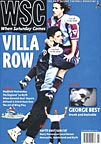 Dundee United's manager has blamed recent poor results on the disruptive behaviour of the club's fans. Ken Gall reports
Dundee United's manager has blamed recent poor results on the disruptive behaviour of the club's fans. Ken Gall reports
“A sinking ship” is a familiar term to fans of atrophying clubs everywhere. For the rapidly dwindling ranks of Dundee United followers, however,a more appropriate analogy is that of a sinking ship opening fire on its rescuers.
In February, United manager and all-time club great Paul Sturrock responded to a 1-0 League Cup semi-final defeat by Aberdeen in novel fashion. Rather than blaming his players, the opposition, the referee, the pitch, the weather or the gods of fortune, Sturrock laid the responsibility fairly and squarely on the shoulders of the United for Change fans’ pressure group. The group’s recent actions and criticisms had been, Sturrock asserted, intolerable and were causing him to rethink his position – a line initiated and encouraged by Sturrock’s mentor, chairman Jim McLean.
The campaign by UfC is a salutary lesson for all believers in the romance of people power. For this is the conundrum – how does one deal with individuals whose motives are uncertain, whose power is near-absolute and who have shown absolutely no willingness either to step aside or to compromise?
UfC was established in 1998, with stated objectives of opening up the club’s shares to supporters, bringing in new investment and ideas to the boardroom and improving the club’s public relations. In the two years since, and despite a thoughtful and constructive campaign which has been as far from knee-jerk reaction as can be imagined, precisely none of those objectives has been met.
Admittedly, United’s PR has been improved to the extent that a prominent Scottish company now handles such matters for the club. However, much of the firm’s time appears to be taken up with scurrilous attacks on UfC’s members and backers – people who, lest it be forgotten, have families and businesses, all of which deserve more attention than an ailing and ungrateful football club.
Chairman McLean is backed by a supine board of directors, made up of anonymous local business types and the club’s former stalwart centre-half Doug Smith. The likelihood of any of them disagreeing with McLean is virtually identical to the chances of the Communist inner circle taking Stalin to task over the failure of the five-year plan.
UfC associated itself initially with local businessman Eddie Thompson who, while not a multi-millionaire in the Jack Walker mould, was seen as a catalyst for new ideas and possibly new finance. Thompson – a long-time season ticket-holder and club sponsor – was soon added to McLean’s list of enemies. An extremely unpleasant legal dispute over shares also resulted in the embittered family of the late director George Fox throwing their weight behind the UfC campaign.
The response to continual demands for new investment in the club was that tense negotiations involving unspecified big players were at a vital stage; big money, fans were informed, would be injected only if UfC’s destabilising campaign were ended. Finally, the great news came – a £3 million line of credit had been extended to the club by its bankers. Far from “new investment”, the club had merely negotiated a glorified overdraft.
The fruits of the policy of selling off the club’s prime asset, Billy Dodds, to Rangers reserves for a paltry £1.2 million, and attacking some of its longest-serving supporters, could be seen a month after the League Cup semi-final, when fewer than 7,000 were at Tannadice to watch Aberdeen, again, put United out of the Scottish Cup. The club’s league form collapsed and a relegation battle that had seemed unthinkable in October began to appear all too probable by March.
United for Change has, after two years, failed to bring about the change that is needed. This might be seen as a victory for Jim McLean and a defeat for the fans, but in truth there is victory for no one and defeat only for Dundee United itself. The campaign will continue, but one must wonder whether UfC or McLean has the greater powers of endurance. History suggests it may be the latter.
From WSC 159 May 2000. What was happening this month